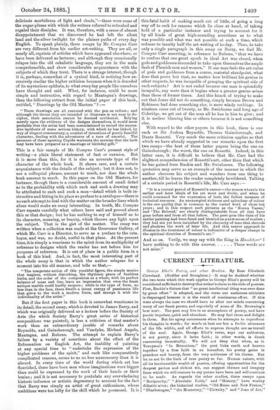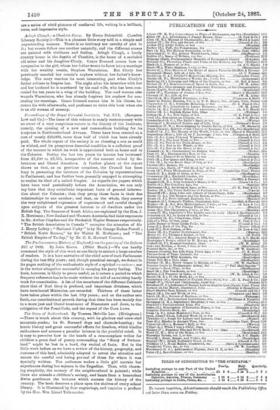C URRENT LITERATURE.
George Eliot's Poetry, and other Studies. By Rose Elizabeth Cleveland. (Hodder and Stoughton.) —It may be doubted whether the two tests which this work applies to George Eliot's poetry will be considered sufficient to destroy that writer's claim to the title of poetess. First, Ruskin's dictum that "no great intellectual thing was ever done by great effort" is adopted, and the verse our authoress criticises is disparaged because it is the result of continuous effort. If this were always the case we should have to alter our minds concerning many of our finest poems, and especially of some of Mr. Browning's best work. The poet may live in an atmosphere of poetry, and have poetic impulses, quick and abundant. He may feel these and delight in them. But his agony commences when he attempts to reproduce his thoughts in words ; for words at best are but a feeble utterance of the life within, and all efforts to express thought are as travail of the soul. Again, George Eliot's verse, says our authoress, is not poetry, since it lacks faith ; in other words, is dumb concerning immortality. We will not deny that when, as in Tennyson's "In Memoriam," the poet links earth and heaven together by a firm faith in an hereafter, his poetry gains in grandeur and beauty, from the very nobleness of his theme. Bat let us not fix the limit of true poetry so far. Human nature, with all its inexhaustible wealth of passion, offering opportunities for the deepest pathos and richest wit, can suggest themes and imagery from which we will venture to say poems have been and will continue to be made. As regards the other studies, three essays upon "Reciprocity," "Altruistic Faith," and "History," have worthy didactic aims; the historical studies, "Old Rome and New France," "Charlemagne," "the Monastery," "Chivalry," and "Joan of Arc," are a series of vivid pictures of mediaeval life, writtep in a brilliant, terse, and impressive style.



































 Previous page
Previous page